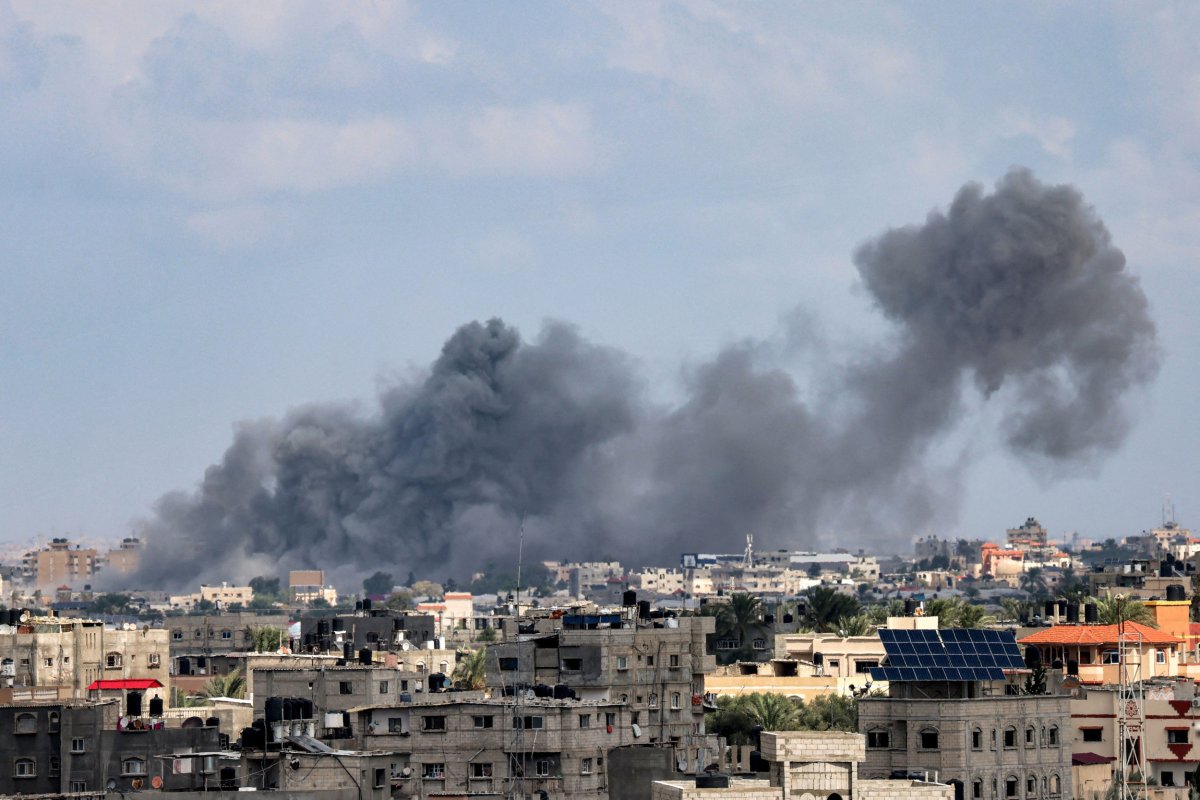The blast that rocked a hospital in Gaza and killed hundreds of Palestinians on Oct. 17 upended President Joe Biden's wartime trip to the Middle East, with Amman cancelling a summit between him and the leaders of Egypt, Jordan, and the Palestinian Authority. Palestinians and Israelis blamed each other for the bombing of Al-Ahli Hospital, which served as a shelter for thousands of Palestinians.
In an emergency meeting in Jeddah on Oct. 18, the Organization of Islamic Cooperation condemned Israel's "unprecedented aggression against civilians in the besieged Gaza Strip and the entire occupied Palestinian territory." It called on Israel to stop the escalation, adhere to international law, and not to target civilians. On the same day, the U.S. blocked a U.N. resolution that denounced all violence against civilians and called for a pause to allow for humanitarian aid to Gazans.
A day earlier, the U.N. rejected a Russian resolution that condemned violence and terrorism against civilians. Such division on the Israeli-Hamas war is polarizing the world and raising anger toward the U.S. on the Arab street, with images of "ugly America" rising once again in the Arab mind. My 83-year-old mother told me that the dead bodies at the Gaza hospital revived images in her mind of the killing of 12-year-old Muhammad al-Durrah, the Palestinian boy who was shot by Israeli soldiers in Gaza in 2000.
Israel has been maintaining a brutal offensive on Gaza since Hamas launched the surprise attack on Oct. 7, which left more than 1,200 Israelis dead. Israeli retaliation strikes—the fiercest in the 75-year history of Israeli-Palestinian conflict—has turned Gaza into rubble. More than 3,500 have been killed in Gaza and 1,400 in Israel, with thousands injured on both sides. Hamas also claims to hold more than 200 hostage.
As the Israeli-Hamas conflict drags on, Israeli troops prepare for a ground attack on shattered Gaza, whose nearly 1 million people are now displaced. Water—according to UNRWA—is running out and putting the lives of 2 million people at risk in Gaza. U.N. human rights experts have cautioned that Palestinians are in critical danger of "mass ethnic cleansing."

Flowing military supplies to Israel by the West will increase fear of violence passing through to the Rafah Egypt-Gaza crossing—the main exit point into Sinai from Gaza not controlled by Israel. Gaza has been under a strict blockade enforced by Israel and Egypt in 2007. Due to Hamas' ties with Egypt's Muslim Brotherhood, the government of President Abdel Fattah el-Sisi, like its predecessors, has maintained a policy of containment toward the Palestinian Islamist group.
Similar to the 2014 clashes between Hamas and Israel, Cairo has been pushing for a ceasefire. Sisi cautioned that the conflict may spread to neighboring states, with his government prioritizing domestic security by temporarily shutting down the Rafah crossing, which Israel bombed on Oct. 10 for the third time in 24 hours. He described the escalation in Gaza as "highly dangerous," and that his country wouldn't permit the crisis to be settled at the expense of others via the displacement of Gazans.
Pressure on the Gaza Strip border alarms the Sisi government, with fear of a mass exodus of Palestinians southwest toward the Sinai Peninsula. Egyptians claim that the hardline Benjamin Netanyahu government is trying to coerce Gazans to migrate to Egypt through the Rafah crossing. They call on Israelis and Palestinians to resolve the conflict within their borders. Hence, Cairo has been urging Israel to provide safe passage for civilians from the Palestinian enclave rather than pushing them to flee toward Sinai.
There is a humanitarian crisis at Egypt's border with Gaza. Foreign aid to Palestinians must not be halted. Since Israel launched its siege of Gaza, ordinary Egyptians on the street have been fiercely calling on Washington to suspend its military supplies to Israel. These U.S. weapons and warships are used to "eradicate the Palestinian people," an Egyptian in his twenties told me on Tuesday. Israel, according to Human Rights Watch, has used white phosphorus, a toxic chemical, in its attacks on Gaza and Lebanon, endangering civilians' health.

The Israel-Hamas war has reinvigorated support for Palestinians on the Arab street. It's myopic from the Netanyahu government to believe that forcing Gazans to flee into Sinai will solve issues at home.
Western nations should now realize that only a two-state solution, based on the pre-1967 borders, can bring a lasting peace between Palestinians and Israelis. Unless concrete measures are taken, this conflict will escalate, especially as gunfire exchange continues between Israel and Hezbollah alongside attacks launched from Syria. Only with the establishment of a Palestinian state with East Jerusalem as its capital can we resolve the Arab-Israeli conflict and establish a lasting peace in the Middle East.
Mohamed El-Bendary, an independent researcher based in Egypt, taught journalism in the United States and New Zealand. He is the author of The "Ugly American" in the Arab Mind: Why Do Arabs Resent America?
The views expressed in this article are the writer's own.
Uncommon Knowledge
Newsweek is committed to challenging conventional wisdom and finding connections in the search for common ground.
Newsweek is committed to challenging conventional wisdom and finding connections in the search for common ground.





